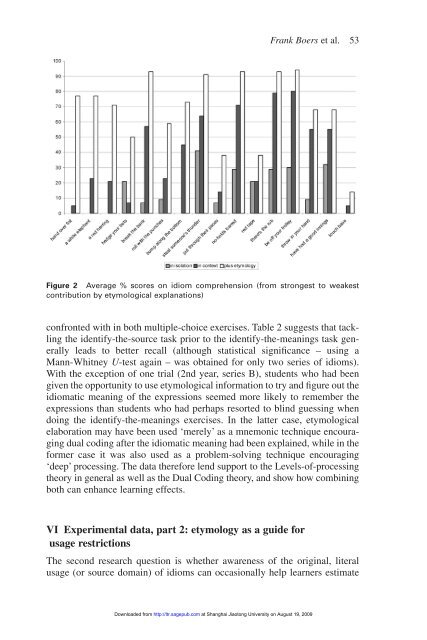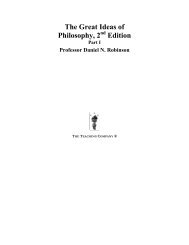Language Teaching Research
Language Teaching Research
Language Teaching Research
You also want an ePaper? Increase the reach of your titles
YUMPU automatically turns print PDFs into web optimized ePapers that Google loves.
confronted with in both multiple-choice exercises. Table 2 suggests that tackling<br />
the identify-the-source task prior to the identify-the-meanings task generally<br />
leads to better recall (although statistical significance – using a<br />
Mann-Whitney U-test again – was obtained for only two series of idioms).<br />
With the exception of one trial (2nd year, series B), students who had been<br />
given the opportunity to use etymological information to try and figure out the<br />
idiomatic meaning of the expressions seemed more likely to remember the<br />
expressions than students who had perhaps resorted to blind guessing when<br />
doing the identify-the-meanings exercises. In the latter case, etymological<br />
elaboration may have been used ‘merely’ as a mnemonic technique encouraging<br />
dual coding after the idiomatic meaning had been explained, while in the<br />
former case it was also used as a problem-solving technique encouraging<br />
‘deep’ processing. The data therefore lend support to the Levels-of-processing<br />
theory in general as well as the Dual Coding theory, and show how combining<br />
both can enhance learning effects.<br />
VI Experimental data, part 2: etymology as a guide for<br />
usage restrictions<br />
Frank Boers et al. 53<br />
Figure 2 Average % scores on idiom comprehension (from strongest to weakest<br />
contribution by etymological explanations)<br />
The second research question is whether awareness of the original, literal<br />
usage (or source domain) of idioms can occasionally help learners estimate<br />
Downloaded from<br />
http://ltr.sagepub.com at Shanghai Jiaotong University on August 19, 2009














